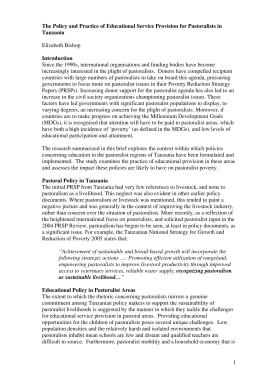The Policy and Practice of Educational Service Provision for Pastoralists in Tanzania
The Policy and Practice of Educational Service Provision for Pastoralists in Tanzania
Since the 1990s, international organisations and funding bodies have become increasingly interested in the plight of pastoralists. Donors have compelled recipient countries with large numbers of pastoralists to take on board this agenda, pressuring governments to focus more on pastoralist issues in their Poverty Reduction Strategy Papers (PRSPs). Increasing donor support for the pastoralist agenda has also led to an increase in the civil society organizations championing pastoralist issues. These factors have led governments with significant pastoralist populations to display, to varying degrees, an increasing concern for the plight of pastoralists. Moreover, if countries are to make progress on achieving the Millennium Development Goals (MDGs), it is recognised that attention will have to be paid to pastoralist areas, which have both a high incidence of ‘poverty’ (as defined in the MDGs), and low levels of educational participation and attainment.

